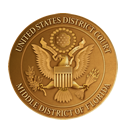
 Operation Peacemaker
Operation PeacemakerOperation Everglades only temporarily slowed down the local drug trade. The deadly Miami Cocaine Wars began with Cubans and Colombians in Miami fighting to control the drug trade in and out of the city. Smugglers who had not been arrested in Operation Everglades began moving an estimated five million pounds of Colombian marijuana and more than 100,000 pounds of cocaine through Collier County, feeding an increasing demand for drugs throughout the country.
It all ended in 1987 with Operation Peacemaker, an investigation that joined the:
• United States Attorney’s Office;
• United States Drug Enforcement Agency;
• United States Customs Office;
• United States Marshal’s Office;
• Florida Department of Law Enforcement;
• Florida Marine Patrol; and
• Local law enforcement.
Operation Peacemaker led to the indictment of more than 175 individuals for marijuana and cocaine smuggling into Southwest Florida between 1988 and 1991.
141 PEOPLE
WENT TO PRISON.
(SOME FOR LIFE)
Special Agent David Waller
Florida Department of Law Enforcement
In 1987, the Florida Department of Law Enforcement joined with several local, state, and federal agencies to dismantle marijuana-smuggling organizations based out of Everglades City, Florida.
“One of the first major indictments revolved around an incident known as, “The Pine Island Dump.”
Law enforcement agencies had recovered approximately 40,000 pounds of marijuana that had been dumped in the waters off the coast of Sanibel Island. The marijuana had been destined to offload on Pine Island, but had been thrown into the waters by the smugglers after law enforcement stopped one of the smuggling vessels.
The indictment listed 44 individuals involved in this single operation. The arrests clogged the courts for several days, as defendants were arrested and brought to Fort Myers to appear before the United States magistrate judge. Several additional indictments were quickly handed down and arrests continued. Federal resources were brought in from other districts to handle arrests and ensure security for court personnel."


(left) HEADLINE: Accused smugglers plead innocent; (right) Special Agent David Waller (in the blue cap) stands between United States
Coast Guard and Customs agents with a 2,000-pound marijuana seizure. The marijuana was brought into the Coast Guard station in Fort Myers.
 Operation Black Rock
Operation Black RockOperation Black Rock was a 20-month probe of a drug ring in the late 1980s. Black Rock resulted in the arrests of two Fort Myers-based suppliers of crack cocaine and heroin.
Ronnie Tape and Larry White operated a network that supplied heroin and cocaine throughout Florida and across the nation. The multimillion-dollar proceeds were laundered through a Fort Myers nightclub, The Phase II Lounge and a private state-of-the-art recording studio in Los Angeles.
Tape, who enjoyed a lavish Beverly Hills lifestyle, owned multiple homes and properties, luxury cars, and expensive jewelry.



(left to right) HEADLINE: Suspected drug lord captured; HEADLINE: They say I'm slick. they say I'm cool...'Well, look at me now'; HEADLINE: County drug lord gets life sentence
In 1988, Ronnie Tape was arrested. At his trial, security was tight. Concerned with threats of assassination and possible rescue attempts, Tape and the marshals wore bulletproof vests. Tape chose to represent himself, and in 1989, was convicted of heading a criminal enterprise, drug trafficking, and defrauding the Internal Revenue Service. He was sentenced to life in prison without parole, which was later reduced to 30 years.
For seven years, Larry White eluded local law enforcement. In 1982, White became a fugitive from Florida to avoid an arrest on gun charges. Known as “the ghost” by the Fort Myers police, White had slipped in and out of Fort Myers unrecognized. He was finally captured in Michigan in 1989. In a surprise move, Larry White pleaded guilty to drug charges in federal court, cutting short an expected week-long trial. White was sentenced to 20 years without parole.

Agent Tony Isom
United States Drug Enforcement Agency
“In addition to crack cocaine and heroin, Tape was also distributing cocaine hydrochloride. The substances were transported from the Miami area in multi-kilogram quantities, sometimes by the trunk load.
One source of supply, Richard “Storyteller” Morrison was also indicted. Morrison was a member of the Jamaican Labor Party and the Jamaican ‘Shower Posse’—so named because they were known to shower their victims with bullets. Because of his affiliation with the Labor Party, extraditing Morrison from Jamaica caused quite a problem. Morrison was sentenced to 25 years without parole.
The investigation culminated with wiretaps on four of Tape’s phones, one of which was a cellular. This was the first cellular wiretap in the DEA Miami field division and only the second cellular wiretap in the DEA.”

